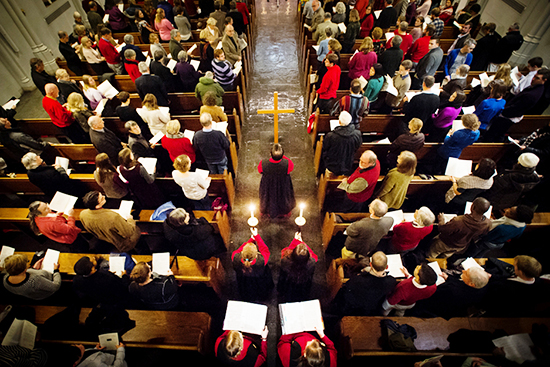Marsh Chapel Premieres an Oratorio for Good Friday
First performance of new composition at traditional service

Marsh Chapel will debut a new oratorio at its Good Friday liturgy. Photo by Jacke Ricciardi
Marsh Chapel’s Good Friday service, a tradition more than three decades old, is debuting an ambitious bit of the new this year.
The three-hour liturgy will premiere The Most Sacred Body of Jesus, a 70-minute oratorio for choir, string orchestra, and a quartet of soloists commissioned for the service. Composed by James Kallembach, its seven cantatas will be performed during the course of the liturgy, which is tomorrow from noon to 3 p.m.
Marsh has debuted many musical works over the decades, but this one “is the most ambitious commission in recent years,” says chapel music director Scott Allen Jarrett (CFA’99,’08), who is also the College of Fine Arts acting director of choral activities. “It is our hope to be at the vanguard of realizing and creating a church music for the 21st century—musically, intellectually, and theologically engaging.”
To compose the music for this most sacred time in the Christian calendar, Jarrett turned to his friend Kallembach, University of Chicago director of choral activities and a senior lecturer in music. For the bulk of his oratorio’s text, Kallembach used both Milton’s epic poem Paradise Lost—recounting Satan’s banishment from heaven and Adam and Eve’s from Eden—and Membra Jesu nostri, a set of 17th-century cantatas by composer Dieterich Buxtehude. The latter work “pays homage to seven parts of the crucified Christ’s body—feet, knees, hands, sides, chest, heart, and face—with related Bible verses and text from a Latin hymn,” he says.

“I am interested in the concept of human evil as portrayed in classic sources,” he adds in describing what inspired his composition. “In this case, Milton is a religious text, in a sense, but I was very drawn to the idea that the divine and earthly planes of existence are parallel and in a sort of eternal time scale. As human evil develops, the cosmological implications play out in heaven. I was very drawn to Milton, a blind poet, who speaks about humankind essentially having no one to blame but themselves. They have reason and free will, but they choose to do evil anyway.
“I try not to make heavy-handed statements in my music,” Kallembach says, but America’s gun violence and global environmental destruction were on his mind as he composed the work. He will attend the service—the Marsh Chapel Choir and Marsh Chapel Collegium have performed his music before—and says he is “very excited to have such a superbly talented conductor and musician as Scott Jarrett taking an interest in my work and interpreting it.”
The public is welcome to attend all or any portion of Marsh’s ecumenical service for Good Friday, when Christians commemorate the crucifixion. The liturgy focuses on Jesus’ utterances as he hung dying on the cross.
It has been a musical Lent at the chapel: the Marsh Chapel Choir and Collegium performed Bach’s St. Matthew Passion last month with the Ashmont Boys Choir of the Episcopal Parish of All Saints in Dorchester.
The Marsh Chapel Good Friday service is tomorrow, Friday, March 25, from noon to 3 p.m., at the chapel, 735 Commonwealth Ave. Find the chapel’s full schedule of Holy Week services here.
Comments & Discussion
Boston University moderates comments to facilitate an informed, substantive, civil conversation. Abusive, profane, self-promotional, misleading, incoherent or off-topic comments will be rejected. Moderators are staffed during regular business hours (EST) and can only accept comments written in English. Statistics or facts must include a citation or a link to the citation.